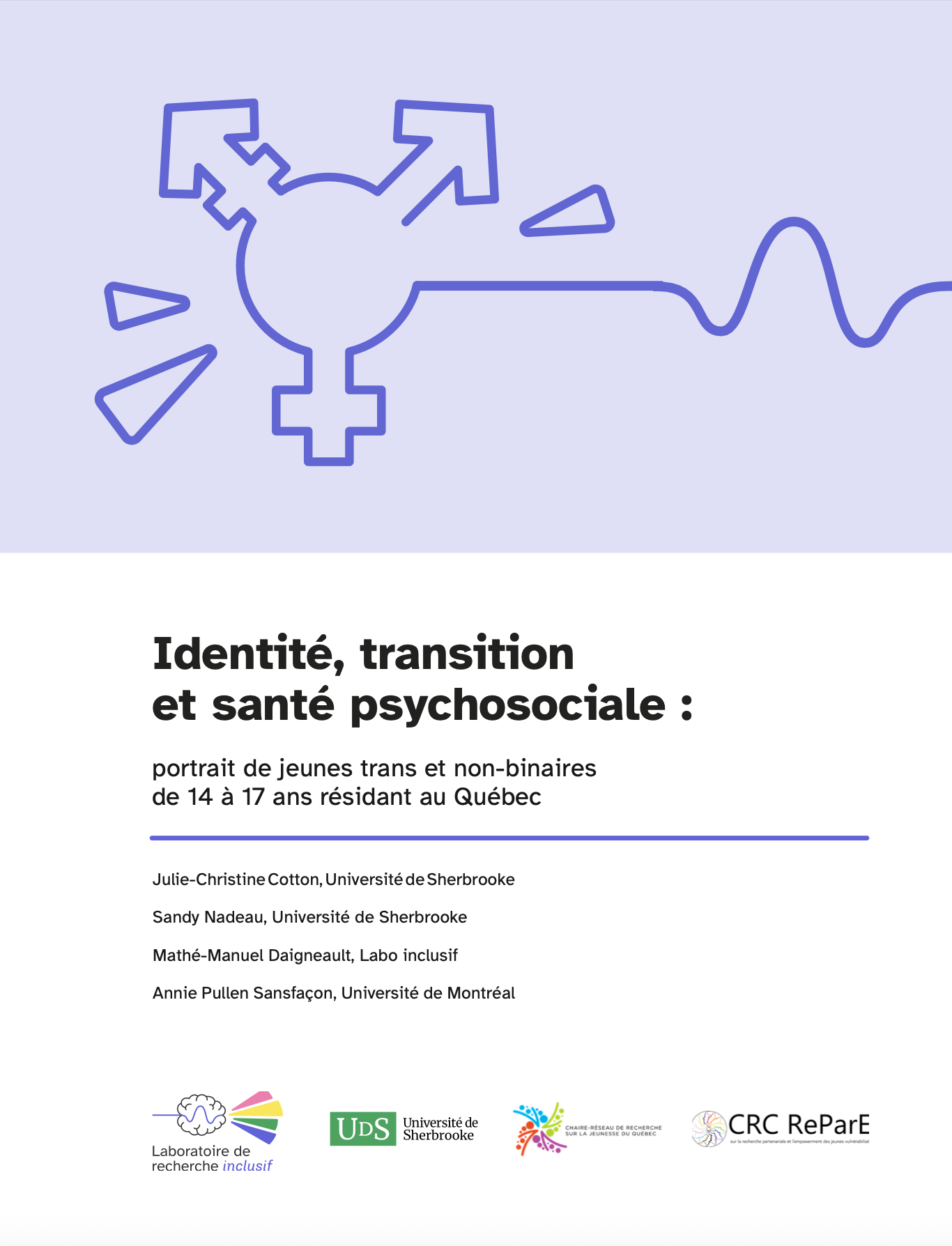
In 2021 and 2022, a Quebec-based study was conducted to assess the needs of 2SLGBTQIA+ individuals and their families in terms of community services and resources. Data was collected through an online questionnaire available from April to December 2021 (quantitative component of the survey) from 1,283 individuals of all ages, as well as five focus groups in the spring of 2022 with 24 2SLGBTQIA+ individuals of different age groups and their loved ones (qualitative component). This research not only provided insight into the nature of the care and services received or expected by these individuals, but also facilitated an in-depth exploration of certain aspects of their identity questioning, coming out or transition journeys, as well as various indicators of their psychosocial health.
This research report focuses on the quantitative component of the survey, with particular emphasis on the results specific to the 239 trans, non-binary, and gender-questioning (TNBQ) youth aged 14 to 17 who completed the online questionnaire.
In general, the results presented in this research report highlight the precarious psychosocial health of the youth surveyed in terms of anxiety, depression and suicidal ideation. They shed light on some of their personal or identity characteristics that may make them more vulnerable to experiences of minority stress. The results corroborate the conclusions of numerous studies reporting the beneficial impacts of free gender expression on the resilience of TNB youths, particularly in social contexts such as school environments.
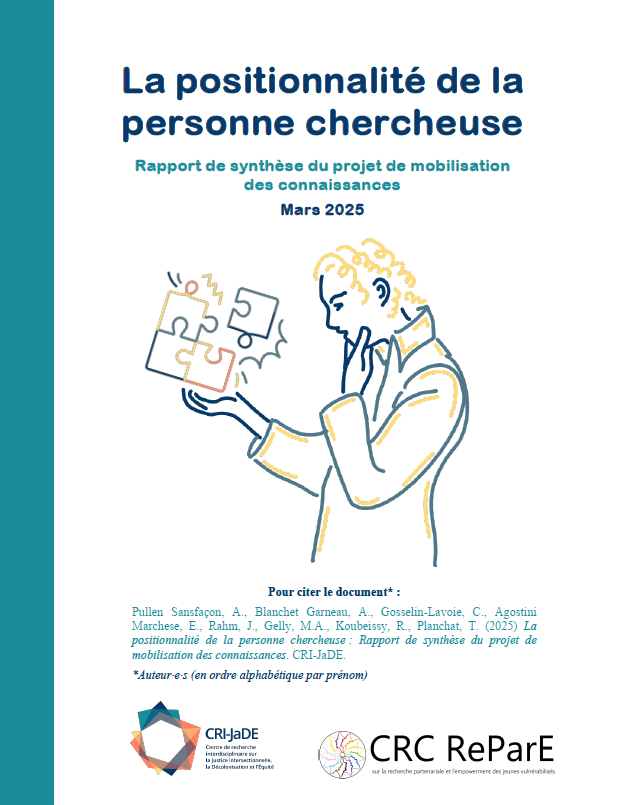
The question of the researcher's position - should he or she be part of the community being studied or not? - is particularly debated, especially between the insider and outsider positions. This report summarises a knowledge mobilisation project funded by the CRI-JaDE, aimed at mobilising a community of practice (CoP) of researchers and professionals with different social positions in relation to the populations under study. The aim of the CoP was to explore issues of positionality and propose solutions to limit their impact on research. This project also involved community organisations in a half-day of sharing. The report presents an overview of the scientific literature, the project's approach, the discussions within the CoP and the suggestions for mitigating the impact of positionality issues.

We are pleased to share with you this new research report which discusses the needs and priorities in terms of gender affirmation (medical and aesthetic interventions) of trans and non-binary people in Quebec. This project was funded by the Fonds de recherche du Québec's Citizen Engagement programme and was co-produced by citizen researcher Claude Amiot and the team at the new CRC ReParE.

This synthesis of knowledge was carried out as part of the research project ‘Devenir soi à travers les chirurgies : une exploration citoyenne dans la recherche transaffirmative’ funded by the Engagement programme of the Fond de Recherche du Québec (FRQ). It is based on a review of the scientific literature on gender-affirming medical and aesthetic procedures and the well-being of trans and non-binary (TNB) people.
Overview
This knowledge synthesis was conducted as part of the research project “Becoming Oneself Through Surgeries: A Citizen Exploration in Trans-Affirmative Research”, funded by the Québec Research Fund (FRQ) under the Engagement Program. It is based on a review of scientific literature concerning gender-affirming medical and aesthetic interventions and the well-being of trans and non-binary (TNB*) individuals. The objective is to provide an overview of recent knowledge related to the medical procedures available in Canada and around the world to affirm one’s gender, and their impacts on individuals’ well-being.
The main questions that guided our research were as follows:
What are the needs of TNB individuals in terms of gender-affirming medical care?
What are the observable impacts of these interventions on their quality of life?
Are there differences between specific groups (gender, age, location, etc.)?
What are the main challenges and barriers to accessing these services in Québec?
Do some individuals experience regret?
In 2022, WPATH published its new Standards of Care (SOC8)¹
The SOC8 were developed through a highly rigorous process.
Over 100 renowned researchers in the field of care for TNB individuals contributed to drafting these guidelines. Each recommendation underwent the Delphi process in order to reach expert consensus. This means that at least 35% of the members must participate in the process, and 75% of them must approve the recommendation. If consensus is not reached, the recommendation may be revised. If no consensus is achieved after the third round of voting, the recommendation is removed.
These updated standards were released ten years after the previous version and already constitute an extensive synthesis of current knowledge. That said, the Standards of Care are a lengthy document, filled with details that can make them difficult to use for individuals not familiar with research or clinical work. Since the project began before the release of these updated standards, and with the aim of developing a questionnaire based on the most current knowledge, we conducted a literature review on the topic. The goal was to document the effects of gender-affirming surgeries on various aspects of mental health among TNB individuals. We began by examining the literature focusing on surgeries and mental health in TNB individuals of all ages. The scope of the research was later expanded to include other types of gender-affirming medical interventions (e.g., hormone therapy, permanent hair removal, etc.), as surgeries are not accessible to minors and because these interventions appear to have a strong impact on the well-being of TNB people. Thus, we also searched databases for studies on the impacts of hormone therapy, puberty or hormone blockers, and so-called “aesthetic” interventions (such as laser hair removal). The review was updated with more recent studies on the subject. The studies consulted relied on various methodologies, including self-administered questionnaires, cohort studies, and individual interviews conducted with people who had undergone these procedures. It is important to note that this is not a systematic review of the literature, but rather a targeted synthesis on the subject. We strongly recommend reading this knowledge synthesis alongside the Standards of Care¹ for more in-depth information. The aim of this review is not to establish new standards of care.
First, we present the context and foundational understanding of gender-affirming medical care:
1.Context
Then, we examine the impacts of medical interventions by focusing on five dimensions of well-being among TNB individuals:
2. Quality of Life
3. Mental Health
4. Sexual Health
5. Relational Well-being
6. Body Satisfaction
Finally, we present the social and legal issues surrounding gender-affirming medical interventions:
7. Current Needs and Desires of the TNB Population Regarding Trans-Affirmative Care
8. Access to Care
9. Regret
Conclusion
Overall, the observable impacts of gender-affirming medical interventions are numerous. A wide range of benefits can be observed in terms of quality of life, mental health, sexual health, relational well-being, and body satisfaction among individuals who receive gender-affirming care. Close follow-up should be provided for TNB individuals who experience difficulties after undergoing certain gender-affirming interventions. However, it is important to acknowledge the ongoing challenges within the healthcare system in adequately responding to the needs of the TNB population. While this report offers some general insights and directions for intervention for professionals working with TNB communities, it is essential to remember that gender affirmation journeys are diverse. As such, care teams should be attentive to the pace and specific requests of each individual. In order to make such care possible, expanding access to services is essential — through increasing service points and training more staff in gender-affirming care. Insurance coverage, which largely includes genital surgeries, mastectomy, and hormone therapy, should also be re-evaluated to encompass aesthetic procedures that significantly impact TNB individuals’ well-being. The TNB population should be consulted to better understand their needs and desires regarding this issue. From a research perspective, there is a need to better understand the realities of specific populations, particularly older adults identifying as TNB. Moreover, perspectives and data on individuals who choose to detransition are important to explore, in order to better contextualize the lived experiences of participants who may have positive or negative feelings related to their journey. Finally, the scientific community should pay greater attention to the concept of gender euphoria — that is, deeply positive experiences related to one’s individual and social sense of gender identity and expression. In our view, gender euphoria could represent a key component of the lived experience for a wide range of individuals who affirm their gender socially, legally, or medically.¹ ²
*A TNB person is someone whose experienced gender identity differs from the sex assigned to them at birth. This person may identify within the binary (trans man, trans woman) or as non-binary (any identity in which gender is not exclusively male or female).
In contrast, a person whose gender identity aligns with the sex assigned at birth is referred to as cisgender.
References
Beischel, W. J., Gauvin, S. E., & van Anders, S. M. (2022). “A little shiny gender breakthrough”: Community understandings of gender euphoria. International Journal of Transgender Health, 23(3), 274–294. https://doi.org/10.1080/26895269.2021.1915223
Bradford, N. J., Rider, G. N., & Spencer, K. G. (2021). Hair removal and psychological well-being in transfeminine adults: Associations with gender dysphoria and gender euphoria. Journal of Dermatological Treatment, 32(6), 635–642. https://doi.org/10.1080/09546634.2019.1687823
Link to synthesis :
Knowledge synthesis: Impact of trans-affirmative medical interventions on quality of life
Knowledge Synthesis: Impact of Gender Affirming Interventions on Mental Health
Knowledge synthesis: Impact of interventions on sexual health
Knowledge synthesis: Impact of transaffirmative medical interventions on relational well-being
Knowledge synthesis: Impact of transaffirmative medical interventions on body satisfaction
Knowledge synthesis: Needs and desires of trans people in relation to gender affirming interventions
Knowledge synthesis: What about post-treatment regret and dissatisfaction?
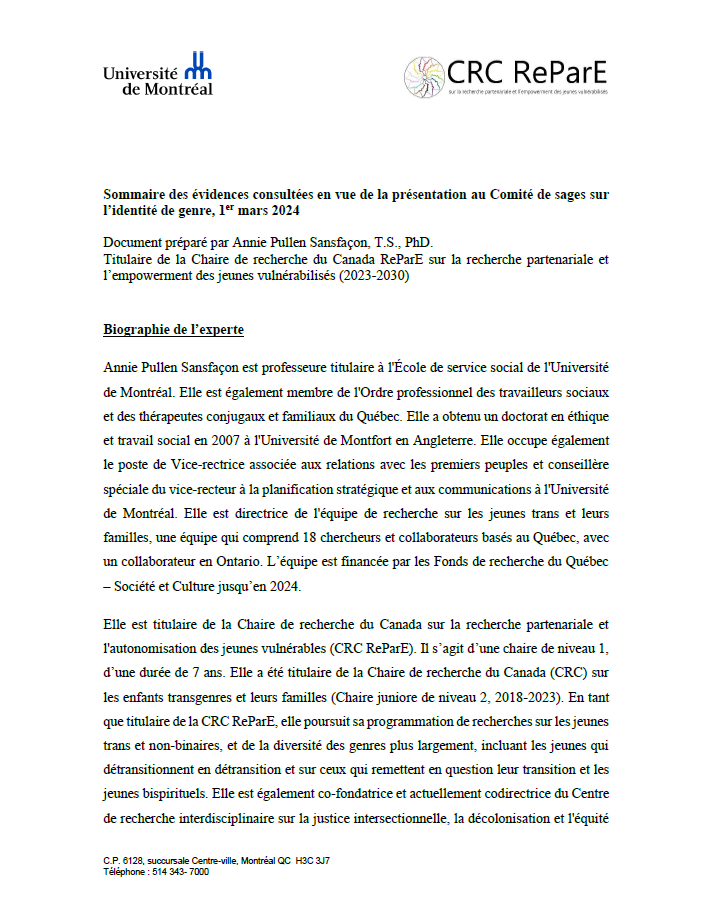
Summary of the most recent evidence, based both on research by the CRC ReParE Chair and on the most up-to-date studies published by other research teams in Canada and internationally. The document presents a synthesis of this knowledge, referencing all the sources consulted. In particular, it helps to:
- Untangle the different forms of transition possible (social, medical and legal).
- Highlight the fact that support and gender affirmation for young trans or non-binary people can take several forms and is generally linked to improvements in their well-being (reduced anxiety, depression, self-harm and suicidal thoughts).
- To present what is known about detransition, highlighting the heterogeneity of pathways.
- To explore the impact of parental support on gender affirmation, whether at the transition stage or during detransition.
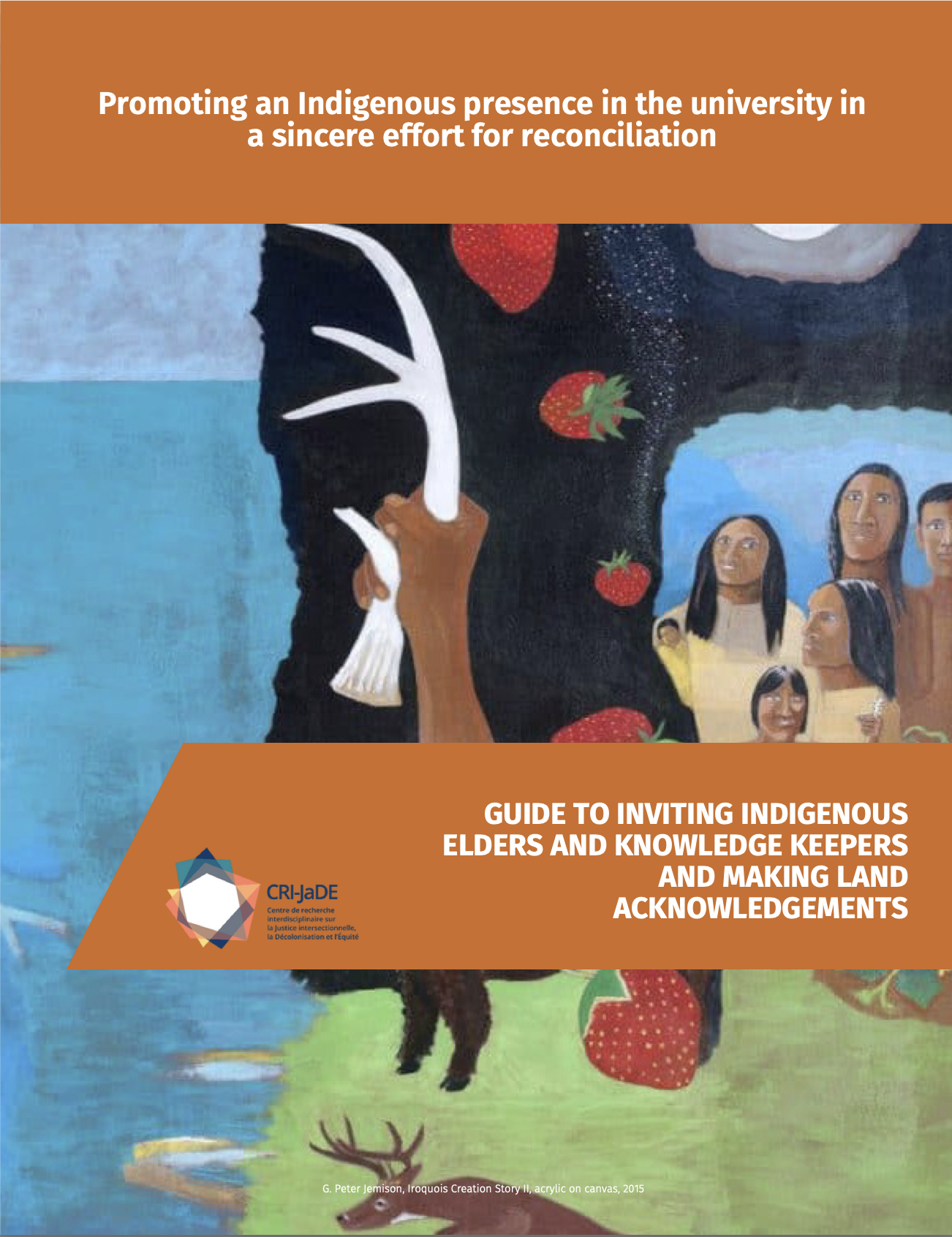
The purpose of this guide is to provide a brief introduction to the fundamental organisational, ethical, and legal parameters that must be taken into account when engaging in activities related to territorial recognition and the welcoming of Indigenous elders in higher education institutions. The principles outlined here can also be applied to practices in other institutions in Quebec and Canada.
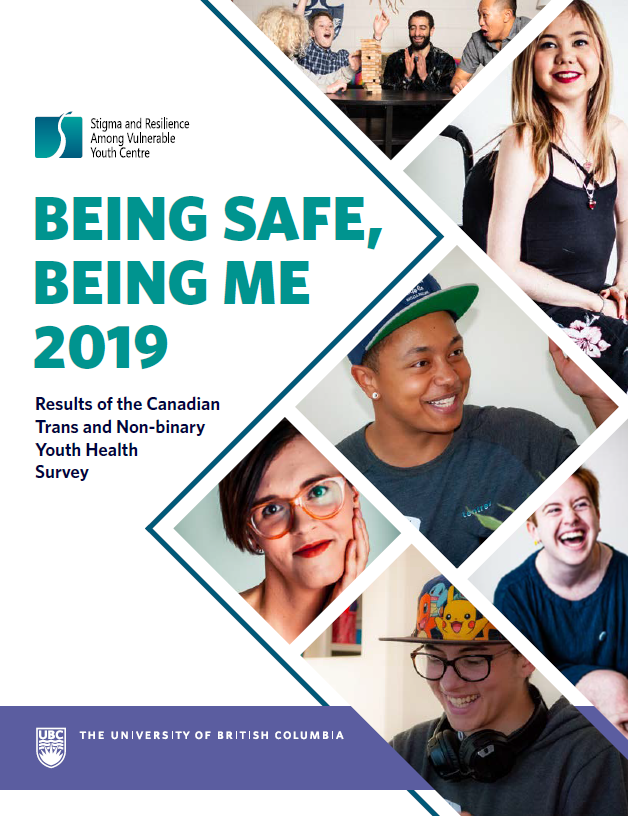
In 2014, SARAVYC conducted a bilingual survey to learn about the health of transgender youth in Canada. It was the first and largest of its kind in Canada. Five years later, in 2019, we conducted the same survey with a few additional questions and heard from 1,519 youth representing every province and territory in the country. Here’s a first glimpse at what they had to say.
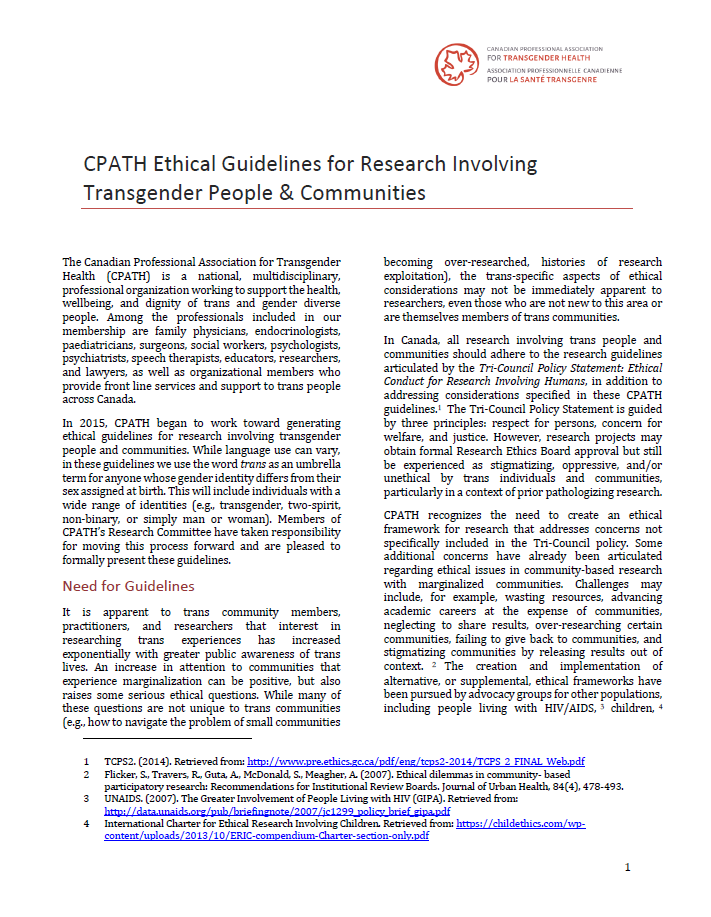
These guidelines were developed to address concerns about research with trans communities not currently articulated by the Tri-Council Policy Statement: Ethical Conduct for Research Involving Humans. The guidelines include a set of overarching principles and a list of guiding questions for transgender research.
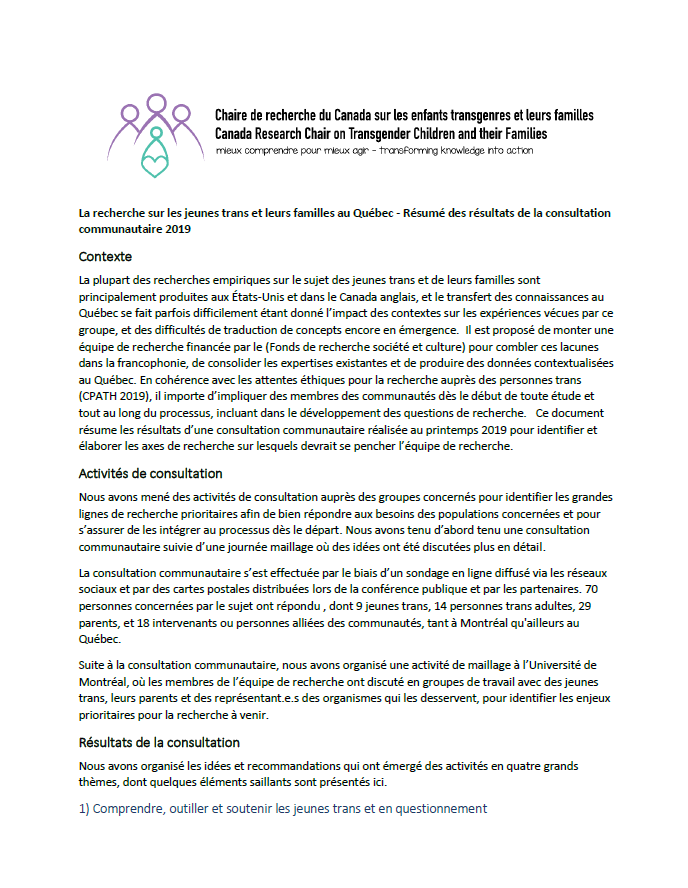
The Canada Research Chair in Transgender Children and Their Families held a major community consultation in spring 2019 to better understand community research needs.
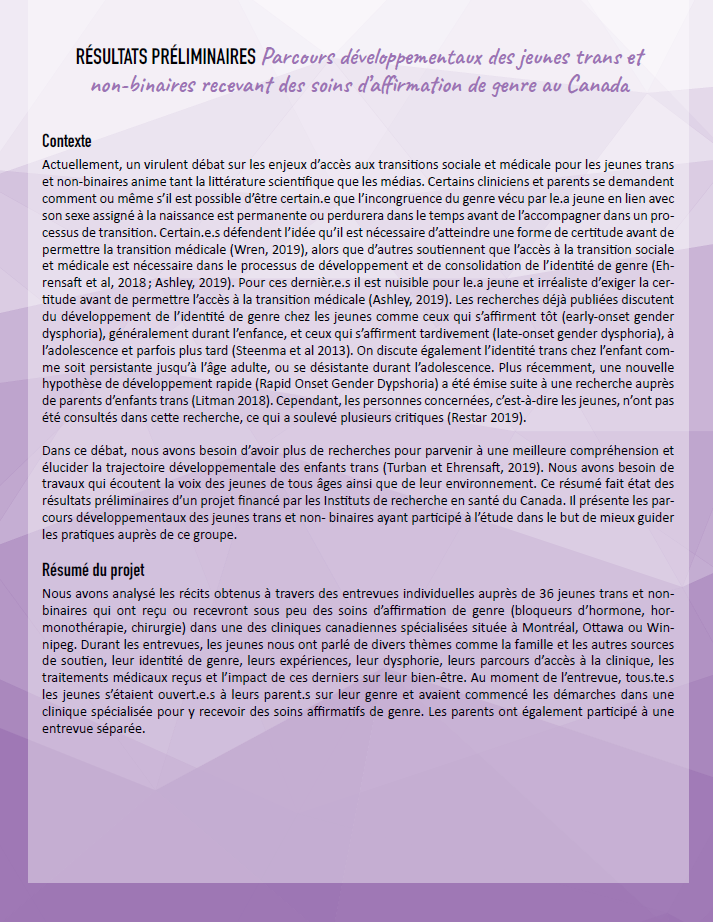
The CIHR-funded ‘Narratives of care and gender affirmation’ project has enabled us to gain a better understanding of how children and young people become aware of, affirm and consolidate their gender identity. This summary presents the preliminary analysis of this theme.
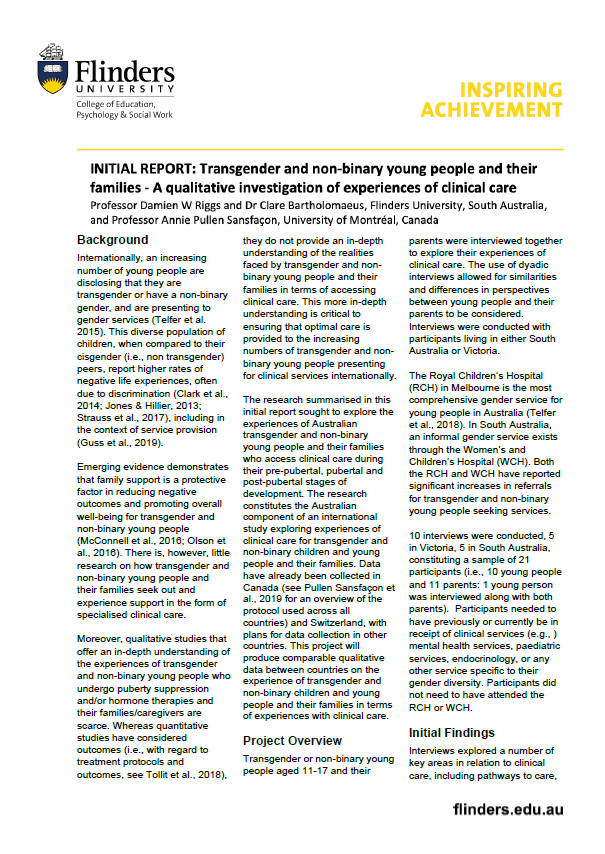
The Research Chair in Transgender Children and their Families is participating in an ongoing research project in Australia with Prof. Damien Riggs, and Dr Claire Bartholomaeus at Flinder University. Re initial report: Transgender and non-binary young people and their families - a qualitative investigation of experience of clinical care in Australia is available here.

The SSHRC-funded project Au delà des apparences: une analyse interesectionelle de l'expérience des jeunes trans au Québec (Beyond appearances: a cross-sectional analysis of the experience of trans youth in Quebec) provides an understanding of the various aspects that hinder and facilitate the well-being of trans youth. This document summarises the resistance strategies used by trans youth in various social contexts.
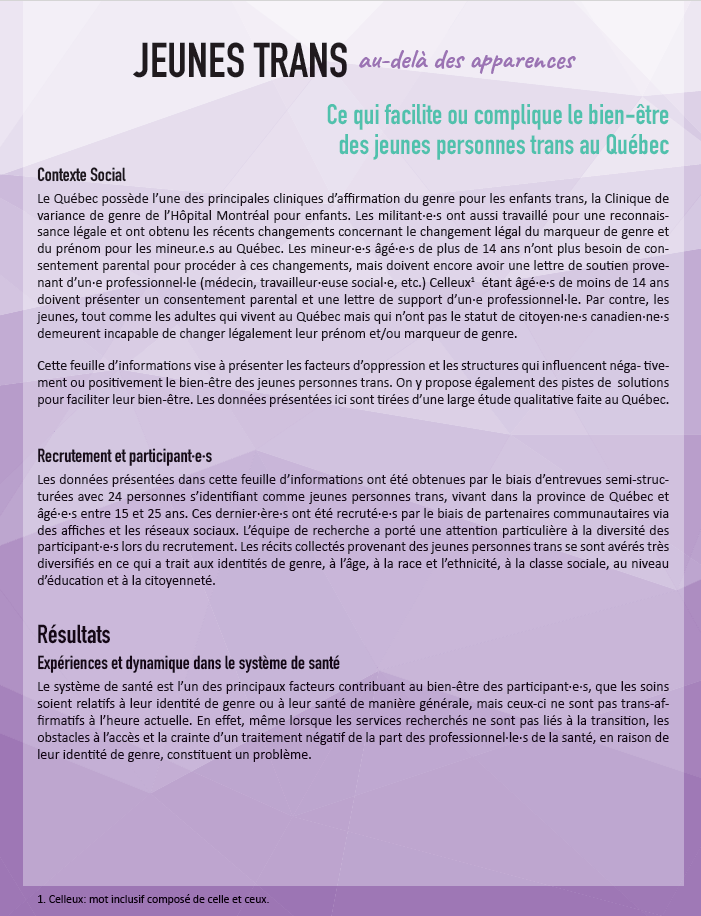
The SSHRC-funded project Au delà des apparences: une analyse interesectionelle de l'expérience des jeunes trans au Québec (Beyond appearances: a cross-sectional analysis of the experience of trans youth in Quebec) provides an understanding of the various aspects that hinder and facilitate the well-being of trans youth. This document summarises what makes their lives easier and more difficult.

The SSHRC-funded project Au delà des apparences: une analyse interesectionelle de l'expérience des jeunes trans au Québec (Beyond appearances: a cross-sectional analysis of the experience of trans youth in Quebec) is helping to understand the various aspects that hinder and facilitate the well-being of trans youth. This document summarises the project's preliminary findings regarding the lived experiences of migrant and racialised trans youth in Quebec.
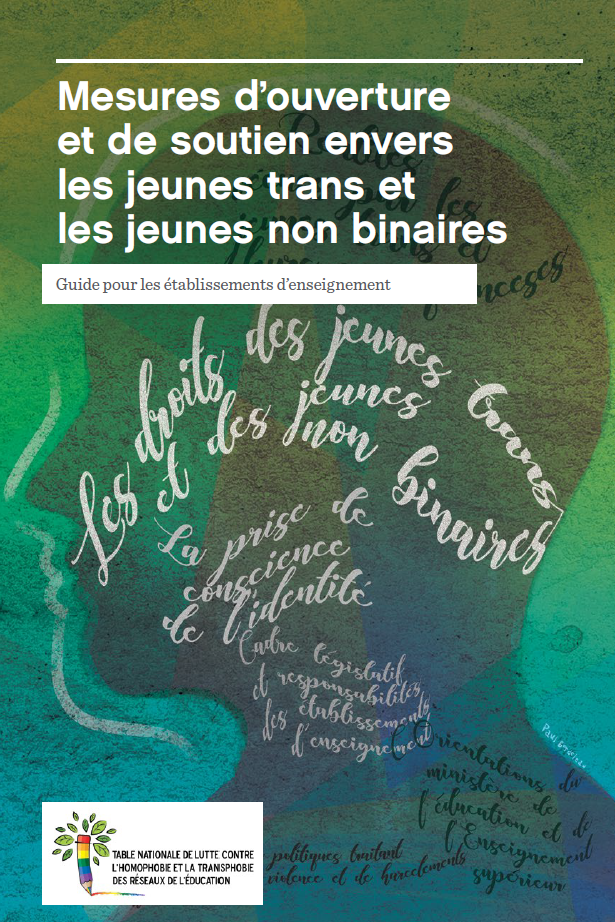
La Table nationale de lutte contre l'homophobie et la transphobie des réseaux de l'éducation a publié un guide pour les établissements d'enseignement sur les mesures d'ouvertures et de soutien envers les jeunes trans et les jeunes non binaires. « La Table nationale de lutte contre l'homophobie et la transphobie des réseaux de l'éducation vise à fournir un cadre de réflexion pour soutenir les établissements d'enseignement dans la mise ne place de mesures concrètes d'ouverture et de soutien envers les jeunes trans et les jeunes non binaires ».
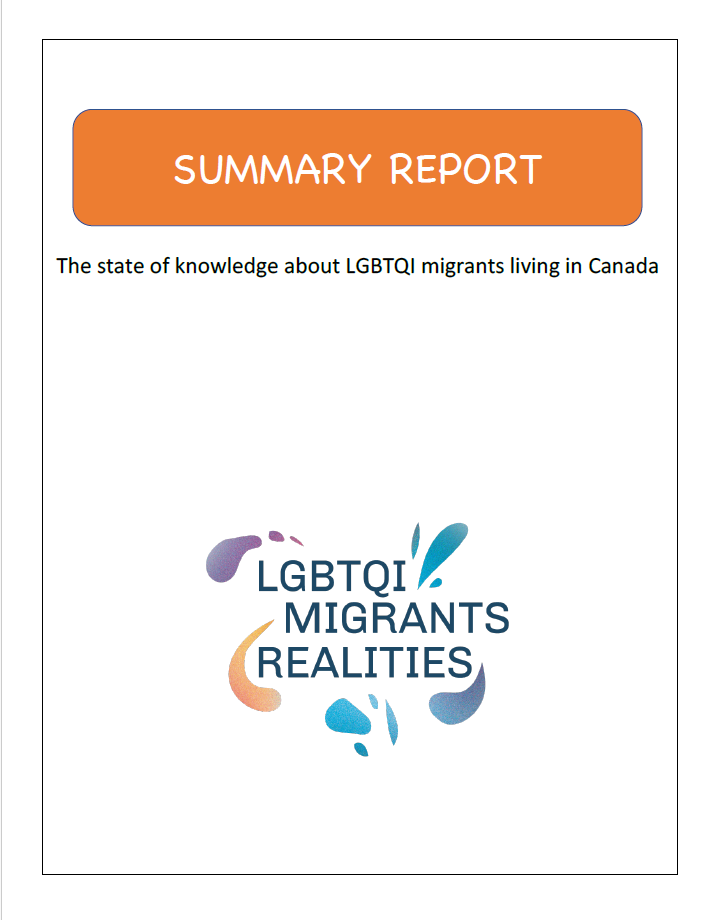
Scoping review methodology was used to rapidly assess a broad range of literature while at the same time identify key knowledge strengths and gaps. A total of 241 publications included in this scoping review, with 56 from Canada, 74 from the US, 50 from elsewhere in the Global North and 61 from the Global South. LGBTQI people living in the Global South: Homophobic and transphobic violence faced by LGBTQI people living in the Global South is always situated within particular geo-political and regional contexts that are shaped by neo-liberalism, gender inequalities, colonial legacies, nationalisms, armed conflict, police violence, corruption, religious extremism, etc. LGBTQI migrants living in Canada: Most focused on LGBTQI refugees.
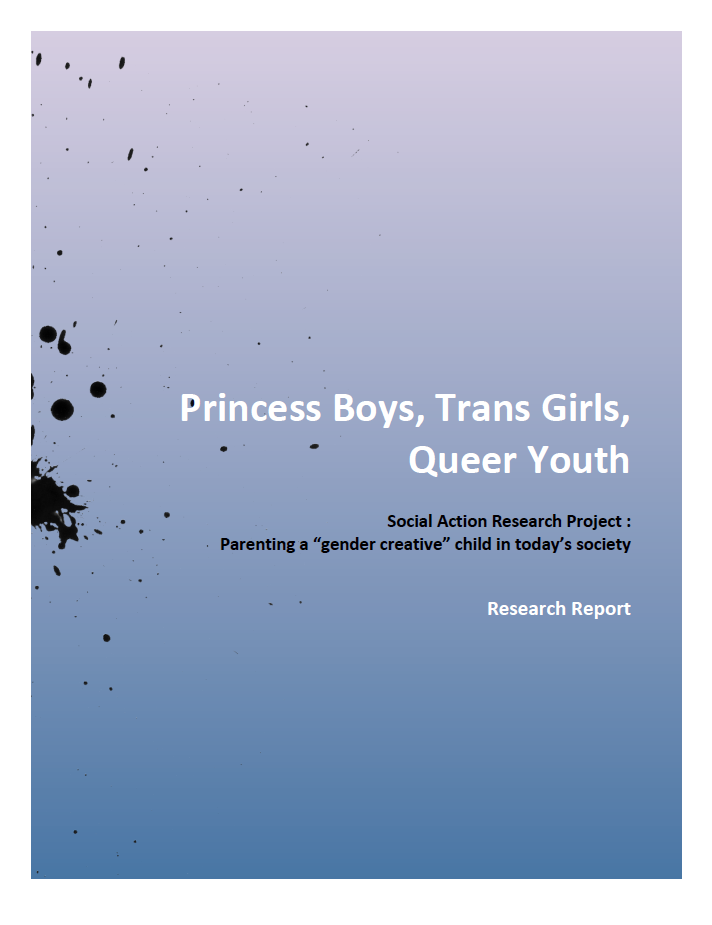
This research report details the findings of a project undertaken with parents of gender independent children. The parent study took place under the auspices of a larger project funded by the Social Sciences and Humanities Research Council of Canada Knowledge Development Grant (Manning, Meyer, Pullen Sansfaçon, 2011-2013). The larger project covers different areas affecting the lives of gender independent children and includes three intertwined pilot projects, one of which being the parent study documented here and the first ever study of the experiences of gender variant children and their parents. The overall aim of the larger project was to generate greater understanding of the reasons why Canadian society, known for its respect of human rights, is excluding a vulnerable part of its population: children and young people who are gender independent. A corollary aim is to develop and formulate questions for future research in this area.